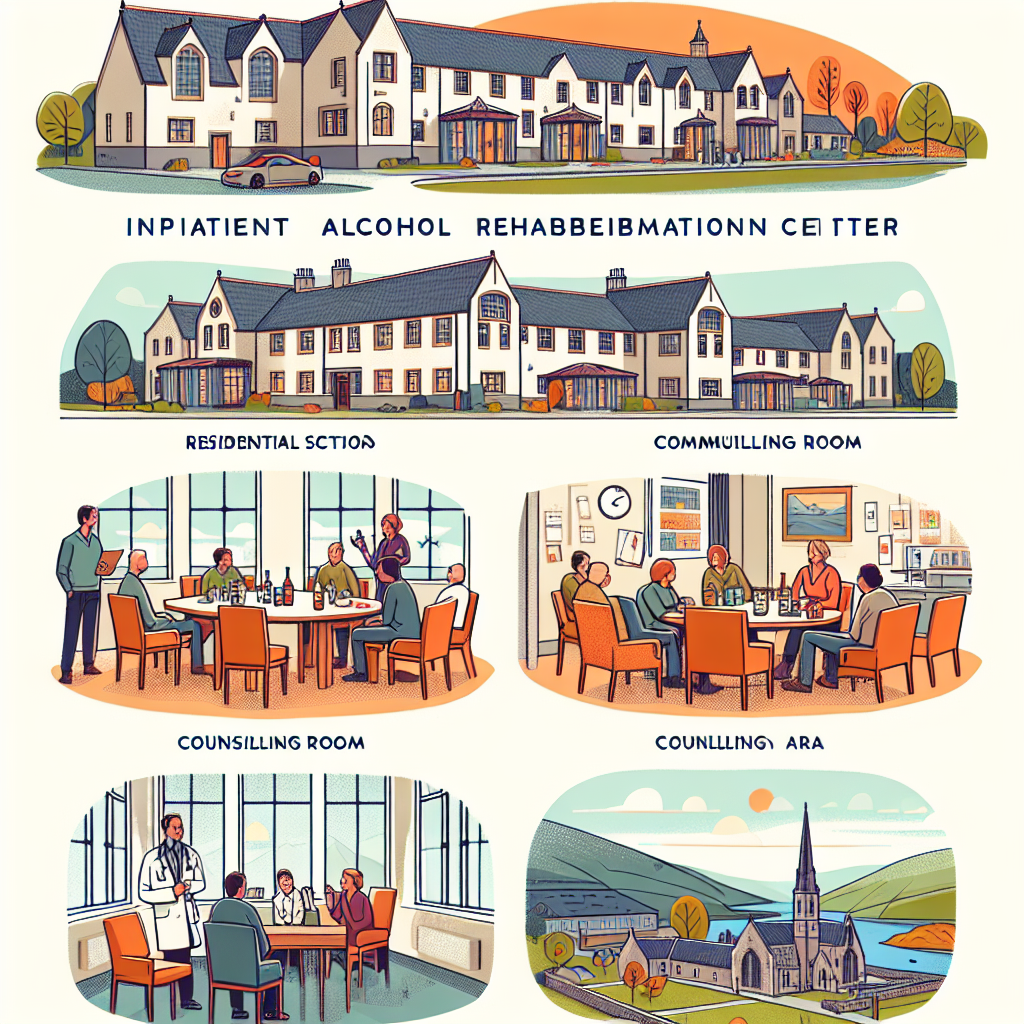-
Table of Contents

“Transform Your Life: Comprehensive Care and Support at Edinburgh’s Premier Inpatient Alcohol Rehab”
Introduction
Inpatient alcohol rehab in Edinburgh offers a structured and supportive environment for individuals seeking to overcome alcohol addiction. Patients can expect a comprehensive treatment program that includes medical detoxification, individual and group therapy sessions, and holistic approaches such as mindfulness and physical fitness activities. The rehab centers are staffed with experienced professionals, including doctors, therapists, and support staff, who provide round-the-clock care and personalized treatment plans. The goal is to help individuals achieve sobriety, develop coping strategies, and prepare for a successful transition back to everyday life.
Comprehensive Treatment Plans in Edinburgh’s Inpatient Alcohol Rehab
Inpatient alcohol rehab in Edinburgh offers a comprehensive approach to treatment, designed to address the multifaceted nature of addiction. When entering such a facility, individuals can expect a structured environment that prioritizes their physical, emotional, and psychological well-being. The journey begins with a thorough assessment, where medical professionals evaluate the extent of the addiction and any co-occurring mental health issues. This initial step is crucial as it forms the foundation for a personalized treatment plan tailored to meet the unique needs of each patient.
Following the assessment, detoxification is often the first major phase of treatment. This process involves the supervised withdrawal from alcohol, ensuring that patients are safe and as comfortable as possible. Medical staff are on hand 24/7 to manage withdrawal symptoms and provide necessary interventions. This phase can be challenging, but it is a critical step towards recovery, and the support provided by the rehab center can make a significant difference in the patient’s experience.
Once detoxification is complete, the focus shifts to therapeutic interventions. Inpatient alcohol rehab centers in Edinburgh employ a variety of evidence-based therapies to help individuals understand the root causes of their addiction and develop coping strategies for the future. Cognitive-behavioral therapy (CBT) is commonly used to help patients identify and change negative thought patterns and behaviors. Additionally, group therapy sessions offer a supportive environment where individuals can share their experiences and learn from others who are on a similar journey. These sessions foster a sense of community and belonging, which can be incredibly empowering for those in recovery.
Moreover, individual therapy sessions provide a more personalized approach, allowing patients to work one-on-one with a therapist to address specific issues and set personal goals. This combination of group and individual therapy ensures a well-rounded approach to treatment, catering to the diverse needs of each patient. Family therapy is also an integral part of the treatment plan, as it helps to repair and strengthen relationships that may have been strained by addiction. Involving family members in the recovery process can provide additional support and improve the chances of long-term success.
In addition to traditional therapies, many inpatient alcohol rehab centers in Edinburgh incorporate holistic treatments into their programs. These may include activities such as yoga, meditation, art therapy, and physical exercise. Holistic treatments aim to heal the whole person—mind, body, and spirit—promoting overall well-being and helping individuals develop healthy habits that can support their recovery.
Education is another key component of comprehensive treatment plans. Patients participate in workshops and seminars that provide valuable information about addiction, relapse prevention, and life skills. These educational sessions equip individuals with the knowledge and tools they need to maintain their sobriety once they leave the rehab center.
As patients progress through their treatment, they work closely with their care team to develop a robust aftercare plan. This plan may include ongoing therapy, support group meetings, and other resources to help individuals stay on track after completing their inpatient program. The goal is to ensure that patients have a strong support network and a clear plan for maintaining their recovery in the long term.
In summary, inpatient alcohol rehab in Edinburgh offers a comprehensive and compassionate approach to treatment. From the initial assessment and detoxification to therapeutic interventions and aftercare planning, every aspect of the program is designed to support individuals on their journey to recovery. With a combination of medical care, therapy, holistic treatments, and education, patients are equipped with the tools they need to overcome addiction and build a healthier, more fulfilling life.
Daily Life and Activities in Edinburgh’s Inpatient Alcohol Rehab
Inpatient alcohol rehab in Edinburgh offers a structured and supportive environment designed to help individuals overcome their addiction and reclaim their lives. Daily life in these facilities is carefully planned to provide a balance of therapeutic activities, personal time, and communal engagement, all aimed at fostering recovery and personal growth. From the moment you step into an inpatient rehab center in Edinburgh, you can expect a warm and welcoming atmosphere where the staff is dedicated to your well-being and success.
Each day typically begins with a structured routine that includes a nutritious breakfast, setting the tone for a day of healing and self-discovery. Mornings often start with group therapy sessions, where individuals can share their experiences and challenges in a safe and supportive environment. These sessions are facilitated by experienced therapists who guide discussions and help participants develop coping strategies. The sense of community and shared understanding in these groups can be incredibly empowering, as individuals realize they are not alone in their journey.
Following group therapy, the day may include individual counseling sessions. These one-on-one meetings with a therapist provide a more personalized approach to treatment, allowing individuals to delve deeper into their personal issues and work on specific goals. The therapists in Edinburgh’s inpatient rehab centers are highly trained and compassionate, offering tailored support to help each person navigate their unique path to recovery.
Afternoons in inpatient rehab are often filled with a variety of therapeutic activities designed to promote physical, emotional, and mental well-being. These can include art therapy, music therapy, and mindfulness exercises, all of which provide creative outlets for expression and stress relief. Physical activities such as yoga, fitness classes, or outdoor walks are also common, encouraging a healthy lifestyle and helping to rebuild physical strength and stamina.
In addition to these therapeutic activities, educational workshops are a key component of the daily schedule. These workshops cover a range of topics, from understanding the science of addiction to developing life skills that support long-term sobriety. Learning about the underlying causes of addiction and gaining practical tools for managing triggers and stress can be incredibly empowering, equipping individuals with the knowledge they need to maintain their recovery outside of the rehab environment.
Evenings in inpatient rehab centers are typically more relaxed, providing time for reflection and personal growth. Many facilities offer quiet time for journaling, meditation, or reading, allowing individuals to process their experiences and emotions. Communal dinners provide an opportunity to connect with fellow residents, share stories, and build supportive relationships that can last long after the rehab program ends.
Throughout the day, the staff at Edinburgh’s inpatient rehab centers are always available to provide support and guidance. Whether it’s a nurse checking in on your physical health or a counselor offering a listening ear, the dedicated team is there to ensure you feel cared for and understood. This constant support is a cornerstone of the inpatient rehab experience, helping individuals feel safe and motivated as they work towards their recovery goals.
In summary, daily life in Edinburgh’s inpatient alcohol rehab centers is a carefully balanced mix of structured activities, personal time, and communal engagement. The supportive environment, combined with a variety of therapeutic and educational activities, provides a comprehensive approach to recovery. By participating fully in the program, individuals can develop the skills and resilience needed to overcome addiction and build a healthier, more fulfilling life.
Q&A
1. **Question:** What types of therapies are commonly offered in inpatient alcohol rehab in Edinburgh?
**Answer:** Inpatient alcohol rehab in Edinburgh commonly offers therapies such as cognitive-behavioral therapy (CBT), group therapy, individual counseling, and holistic therapies like art therapy and mindfulness practices.
2. **Question:** What is the typical duration of an inpatient alcohol rehab program in Edinburgh?
**Answer:** The typical duration of an inpatient alcohol rehab program in Edinburgh ranges from 28 days to 90 days, depending on the individual’s needs and the severity of their addiction.
Conclusion
Inpatient alcohol rehab in Edinburgh offers a structured and supportive environment for individuals seeking to overcome alcohol addiction. Patients can expect comprehensive care that includes medical detoxification, individual and group therapy sessions, and holistic treatments aimed at addressing both the physical and psychological aspects of addiction. The programs are typically tailored to meet the specific needs of each patient, providing a personalized approach to recovery. Additionally, the rehab centers often offer aftercare planning to ensure long-term sobriety and support post-treatment. Overall, inpatient alcohol rehab in Edinburgh aims to equip individuals with the tools and strategies necessary for sustained recovery and a healthier lifestyle.



